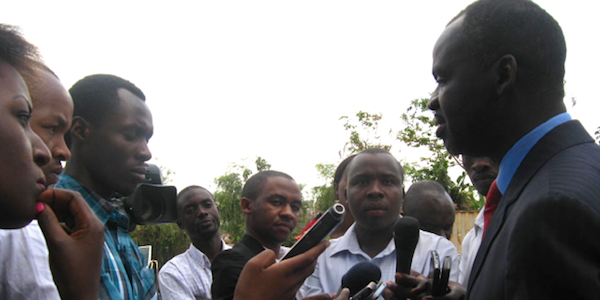As the capital of Rwanda, one of the fastest growing countries in Africa, Kigali looks like a city on the move – new buildings, neat sidewalks and careful landscaping. Natural resources contribute nearly 40 percent to Rwanda’s economy and no one understands this better than Stanislas Kamanzi, the Minister of Natural Resources. He began his career in the local administration and then went on to become the UN Ambassador for Rwanda in New York. He became the Minister of Infrastructure in 2006. Two years later, he was given the portfolio of Natural Resources, including water, environment and mining.
Under his leadership, Rwanda is now a WAVES core implementing country.
Rwanda is one of the 10 signatories to the Gaborone Declaration and hence committed to implementing NCA. Recently, the WAVES team visited Rwanda and discussed WAVES with a wide range of stakeholders. The newly-established Rwandan NCA Steering Committee convened for the first time and it ended with a strong consensus to move forward quickly with WAVES implementation.
The WAVES Team caught up with Minister Kamanzi in Kigali.
You started as Minister of Infrastructure of a country that is one of the fastest growing in Africa. What did you learn about sustainability in that job?
I realized the connections early on. If you did development without considering environment, you were in trouble. For example, if you did a $100 million major transport project, you could end up losing it if you did not consider the geographical location and did a proper Environmental Impact Assessment. In the rainy season, floods or landslide could wash away the entire infrastructure. And now in this job, the challenge is to ensure that when development takes place, sustainability is taken into account.
What are the biggest challenges that Rwanda is facing?
Climate change is affecting every part of the world and adapting to it is a challenge. Here you can see it and experience it. Rwanda is densely populated, there are other challenging physical characteristics – 70 percent of the country is mountains, where families engage in permanent agriculture for their livelihood. This has forced us to choose policies that will fulfill our development ambition, and at the same time keep a balance of natural resources, so vital to our existence. In short, we do not have a choice but to keep this balance.
How will NCA help Rwanda achieve the balance between development and growth?
We need to lay a foundation where development can be realized using sustainable management. Development is a cross cutting sector and we need to mainstream effective decision-making planning in all sectors and not in isolation. NCA is a tool that can help us achieve this balance across sectors and various development needs. - Stanislas Kamanzi, Rwanda's Minister of Natural Resources
When did you first hear of NCA?
This was at the Gaborone Summit for Sustainability in 2012. Rwanda became one of the 10 countries that signed the treaty and committed to NCA. After the conference, we began thinking of how NCA could specifically help Rwanda and what the process would be. Now things are moving quickly and I am thankful to the World Bank for coming here and supporting Rwanda to embark on this process.
What is your vision for Rwanda regarding NCA?
We want the system to be integral to our decision-making process. I am excited at the idea of seeing the value of natural capital getting counted in economic terms.
Through WAVES, I am hoping we will have capacity to undertake this work. We have already set up systems that will let us move forward towards implementation.
What is your message to other African countries?
In Africa, 10 countries have committed to NCA. As a pioneering country on WAVES, we commit to reach out to the others. The continent has ambitions to develop and NCA should become that tool that helps in meeting their ambitions in a sustainable manner.


